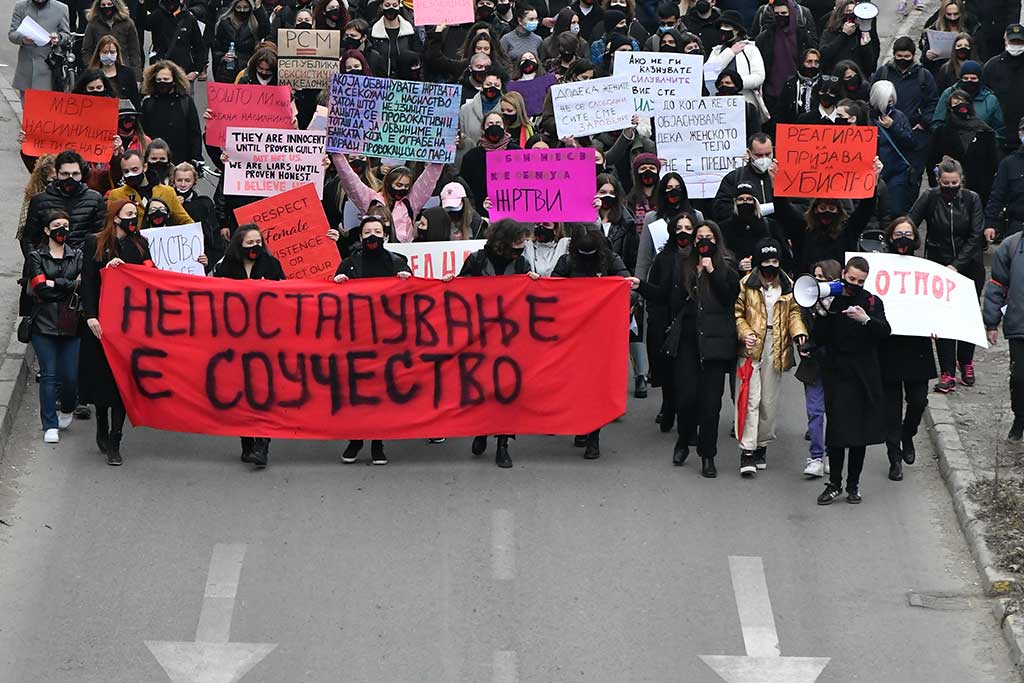#metoo wave sweeps across the Western Balkans
Across the Western Balkans, women’s rights activists are joining forces, demanding an end to sexual violence against women. Our North Macedonia team explains why.

During the spring, momentum has built in several of the countries in the Western Balkans where Kvinna till Kvinna works and supports women’s rights organisations. The region’s recent “#metoo” wave was sparked when Serbian actress Milena Radulović reported her high-school drama teacher, a famous producer, to the police. Her actions encouraged many women and girls to speak out. Before long, two hashtags were trending: #nisisama (you’re not alone) and #nisamtrazila (I didn’t ask for it).
The same patriarchal culture
“Women from different countries have been vocal about the cases of sexual violence experienced from men in power before, but this time it’s different as it’s someone here, from the Balkans,” says Emilija Dimoska, Kvinna till Kvinna programme officer in North Macedonia.
She further explains that women all across the region can relate to Radulović, because the Western Balkan countries share a deeply rooted patriarchal culture that silences women:
“Humiliation and discrimination, misogyny, sexism, silence, naming and shaming women when they are abused—these are just to name few of the common characteristics of the region.”
#nisamtrazila, for example, was established by a group of actresses from Bosnia and Herzegovina serving as a regional open space for victims/survivors of abuse to come forward with their stories and experiences. #СегаКажувам in Macedonian and #TaniTregoj (#ISpeakUpNow) in Albanian were the hashtags that were used by women in North Macedonia. The movement had a spill-over effect in the region in one form or other, in Albania for example there were several anti-sexual violence campaigns implemented, while Kosovo had an ongoing digital campaign against rape and sexual violence under the hashtag #siguripervajzat (security for girls).
Several of Kvinna till Kvinna partner organisations in Bosnia and Herzegovina, Serbia and North Macedonia have seen an increased number of women reporting abuse and seeking support. Others have also noticed a window of opportunity, where their long and hard work to address these systemic issues is finally on the agenda.
Solidarity across borders
In North Macedonia, the women’s movement has taken to the streets.
“Despite the pandemic, women have had the courage to go out into the streets and protest because responsible institutions aren’t acting to ensure justice for women who have experienced sexual violence. And this goes beyond borders,” says Dijana Stojanovic Djordevic, Kvinna till Kvinna programme officer in North Macedonia.
“This new wave means solidarity, strength, support, motivation and empowerment,” she continues.
What now needs to follow is practical steps from authorities to address gender-based violence, and specifically sexual violence. This is needed in all parts of the legal system to ensure legal security for women who are subjected to abuse.
“If only one woman could have justice, it would restore faith in the system. It would also send a signal to men that sexual violence is not tolerated, and that a ‘no’ means ‘no’,” says Voskre Naumoska Ilieva, Kvinna till Kvinna programme officer in North Macedonia.
Kvinna till Kvinna has worked for women’s rights in the Western Balkans since 1994. We support and work with local women’s rights organisations to end gender-based violence and defend women’s rights. Learn more about our work in Europe